Enka (演歌) is a Japanese music genre considered to resemble traditional Japanese music stylistically. Modernenka, however, is a relatively recent musical form, which adopts a more traditional musical style in its vocalism than ryūkōka music, popular during the prewar years.
Ryūkōka is a Japanese musical genre. The term originally denoted any kind of "popular music" in Japanese, and is the sinic reading of hayariuta, used for commercial music of Edo Period. Therefore, imayō, which was promoted by Emperor Go-Shirakawa in the Heian period, was a kind of ryūkōka. Today, however, ryūkōka refers specifically to Japanese popular music from the late 1920s through the early 1960s. Some of the roots of ryūkōka were developed from Western classical music. Ryūkōka ultimately split into two genres: enka and poppusu. Unlike enka, archetypal ryūkōka songs did not use the kobushi method of singing. Ryūkōka used legato. Bin Uehara and Yoshio Tabata are considered to be among the founders of the modern style of kobushi singing.

Ichirō Fujiyama, born Takeo Masunaga, was a Japanese singer and composer, known for his contribution to Japanese popular music called ryūkōka by his Western classical music skills. He was born in Chūō, Tokyo, and graduated from the Tokyo Music School. Although he was regarded as a tenor singer in Japanese popular music, he was originally a classical baritone singer. He also acted in various films, and was a close friend of Minoru Matsuya (1910–1995). His workroom has been reproduced inside the "NHK museum of broadcasting" as an exhibit.
Hikaru Nishida is a Japanese pop singer and actress. She was born in Fujisawa, Kanagawa Prefecture, Japan, and made her singing debut on April 6, 1988 with the release of the single "Fifteen", named after her age at the time. Nishida is affiliated with Manase Productions.

Tamaki Tokuyama was a classically trained baritone and a famous singer of popular music in early Shōwa era Japan.
Sakura Fujiwara in Fukuoka Prefecture, Japan, is a Japanese singer-songwriter and actress. She is managed by the agency Amuse Inc. and signed to SPEEDSTAR RECORDS.
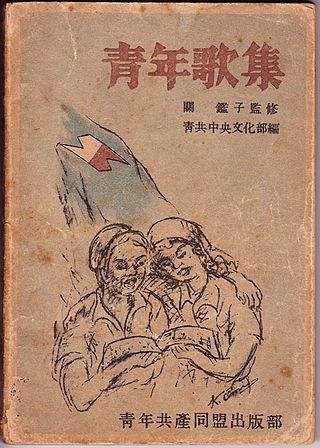
The Singing Voice of Japan is the name of a social and political movement that emerged after World War II in Japan and based on musical and choral activities of the working class of the entire nation. On the ideological position of communism or democratic socialism, activists of the movement organize choral circles in factories, in schools and in their residential areas. The movement reached its peak in the years 1950–60. Japanese singer Akiko Seki is generally regarded as the founder of the Singing Voice of Japan.
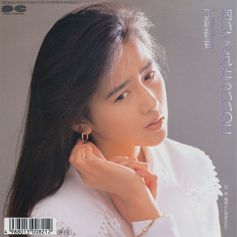
"Daite Kuretara Ii no ni" is a song recorded by Japanese singer Shizuka Kudo. The song was released as a single by Pony Canyon on March 2, 1988. Despite being included in several subsequent compilation albums, "Daite Kuretara Ii no ni" was never included in any studio album. An English version of the song was recorded for Kudo's 1998 ballad compilation album Best of Ballade: Current, on which it is dubbed "Let Me Sleep In Your Arms".
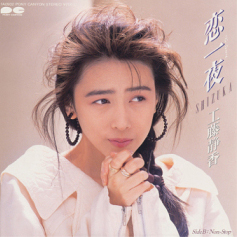
"Koi Hitoyo" is a song recorded by Japanese singer Shizuka Kudo, released on December 28, 1988, by Pony Canyon as the lead single from her third studio album Joy (1989). Almost a year later to the day, Kudo marked her second appearance on Kōhaku Uta Gassen by performing "Koi Hitoyo".

"Kuchibiru Kara Biyaku" is a song recorded by Japanese singer Shizuka Kudo for her fifth studio album, Rosette. It was released by Pony Canyon as the album's lead single on January 10, 1990. Although it was not officially released on vinyl, a few copies were produced for promotional use. Kudo performed the song on the 41st Kōhaku Uta Gassen, marking her third appearance on the program. In 2015, DAM asked their users to select their favorite Shizuka Kudo songs to sing karaoke to and compiled a top ten list; "Kuchibiru Kara Biyaku" came in at number six.
"Metamorphose" is a song recorded by Japanese singer Shizuka Kudo. It is the theme song for the CX television series Nandara Mandara, which starred Kudo herself. It was released as a single through Pony Canyon on October 23, 1991. "Metamorphose" made its first album appearance on the compilation album, Intimate. Kudo performed the song on her fourth appearance on Kōhaku Uta Gassen. In 2015, DAM asked their users to select their favorite Shizuka Kudo songs to sing karaoke to and compiled a top ten list; "Metamorphose" was one of the top vote-getters, rounding up the list at number ten.

"Mechakucha ni Naite Shimaitai" is a song recorded by Japanese singer Shizuka Kudo, from her seventh studio album, Trinity. It was released through Pony Canyon as the album's lead single on January 29, 1992. Kudo performed the song on the 43rd Kōhaku Uta Gassen, marking her fifth consecutive appearance on the annual show. In 2007, Kudo recorded a self-cover of the song with a jazz arrangement for the compilation album Shizuka Kudo 20th Anniversary the Best, released in commemoration of her 20th anniversary.

"Koe o Kikasete" is a song recorded by Japanese singer Shizuka Kudo. It was released as a single through Pony Canyon on August 21, 1992. The song was featured on the AX television series Kyōshi Natsuyasumi Monogatari. It made its first album appearance on the compilation album, Best of Ballade: Empathy, released later that same year.
"Dōkoku" is a song recorded by Japanese singer Shizuka Kudo for her eighth studio album, Rise Me. It was released by Pony Canyon as the album's lead single on February 3, 1993. "Dōkoku" is the theme song of the CX getsuku television series Ano Hi ni Kaeritai, starring Momoko Kikuchi and Kudo herself as two sisters who fall in love with the same man. Kudo performed the song on the 44th Kōhaku Uta Gassen, marking her sixth consecutive appearance on the annual show. With over a million copies sold, "Dōkoku" remains Kudo's best-selling single to date. In 2015, DAM asked their users to select their favorite Shizuka Kudo songs to sing karaoke to and compiled a top ten list; "Dōkoku" came in at number two.

"Blue Rose" is a song recorded by Japanese singer Shizuka Kudo, from her ninth studio album, Expose. It was released through Pony Canyon as the album's lead single on March 18, 1994. The song marks a significant change in artistic direction for Kudo, as it is her first single to be self-produced, as well as her first release since parting ways with long-time collaborator Tsugutoshi Gotō, who has helmed Kudo's songwriting team since her solo debut. It was featured on TV commercials for Seagaia Ocean Dome. The single's B-side, "Door", is the ending theme to the TX television series Tsumiki Kuzushi: Hōkai, Soshite.... Kudo performed "Blue Rose" on the 45th Kōhaku Uta Gassen, marking her seventh consecutive appearance on the show. It is the first in a trilogy of singles with the word "blue" in the title: "Blue Rose" was later followed by "Blue Velvet" and "Blue Zone".
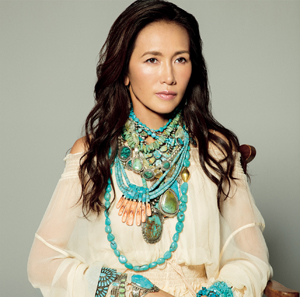
Rin is the seventeenth studio album by Japanese singer Shizuka Kudo. It was released a day shy of Kudo's 30th anniversary, on August 30, 2017, through Pony Canyon. The album marks Kudo's first studio album in over twelve years and includes nine original songs written by Japanese singer-songwriters Koji Tamaki, Tak Matsumoto and Kaori Kishitani, among others. it also features various collaborations with veteran songwriters, including lyricist Gorō Matsui, a long-time collaborator of Kudo's, as well as with new talent, such as Niconico utaite Mafumafu, the singer-songwriter duo Yoshida Yamada and first-time songwriter and author Shizuka Ijūin, while Kudo serves as the album's executive producer.
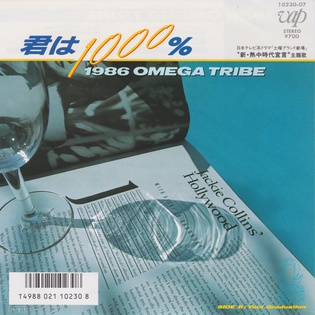
"Kimi wa 1000%" is a song recorded by the Japanese city pop and soft rock band, 1986 Omega Tribe, released on May 1, 1986, by VAP. It is the song most commonly identified with Omega Tribe when Carlos Toshiki was the lead vocalist. The song peaked at #6 on the Oricon charts.
Ena Fujita is a Japanese musician, singer-songwriter and gravure idol. She is managed by Platinum Production and signed to King Records. Due to her two careers she has dubbed herself a "singer-songradol", a portmanteau of "singer-songwriter" and "gradol", an abbreviation of "gravure idol". As a musician she is known for wearing bikinis onstage and for provocative promotional material.

"Coffee Rumba" is a song by Japanese singer Sachiko Nishida, released as the double A-side of her second single "Yokubō no Blues" by Polydor Records in August 1961. It is a Japanese-language cover of the Venezuelan song "Moliendo Café".
Kazuyoshi Saito is a Japanese singer-songwriter. Making his professional debut in 1993, Saito's popularity exploded in 2007 after 15 years in the music industry. He is also one-half of the rock duo Mannish Boys with Tatsuya Nakamura and a member of the supergroup the Curling Sitones. In 2013, Saito became the first Japanese musician to have a signature model acoustic guitar with Gibson. As of 2020, he had six signature models with them and one with Epiphone.











